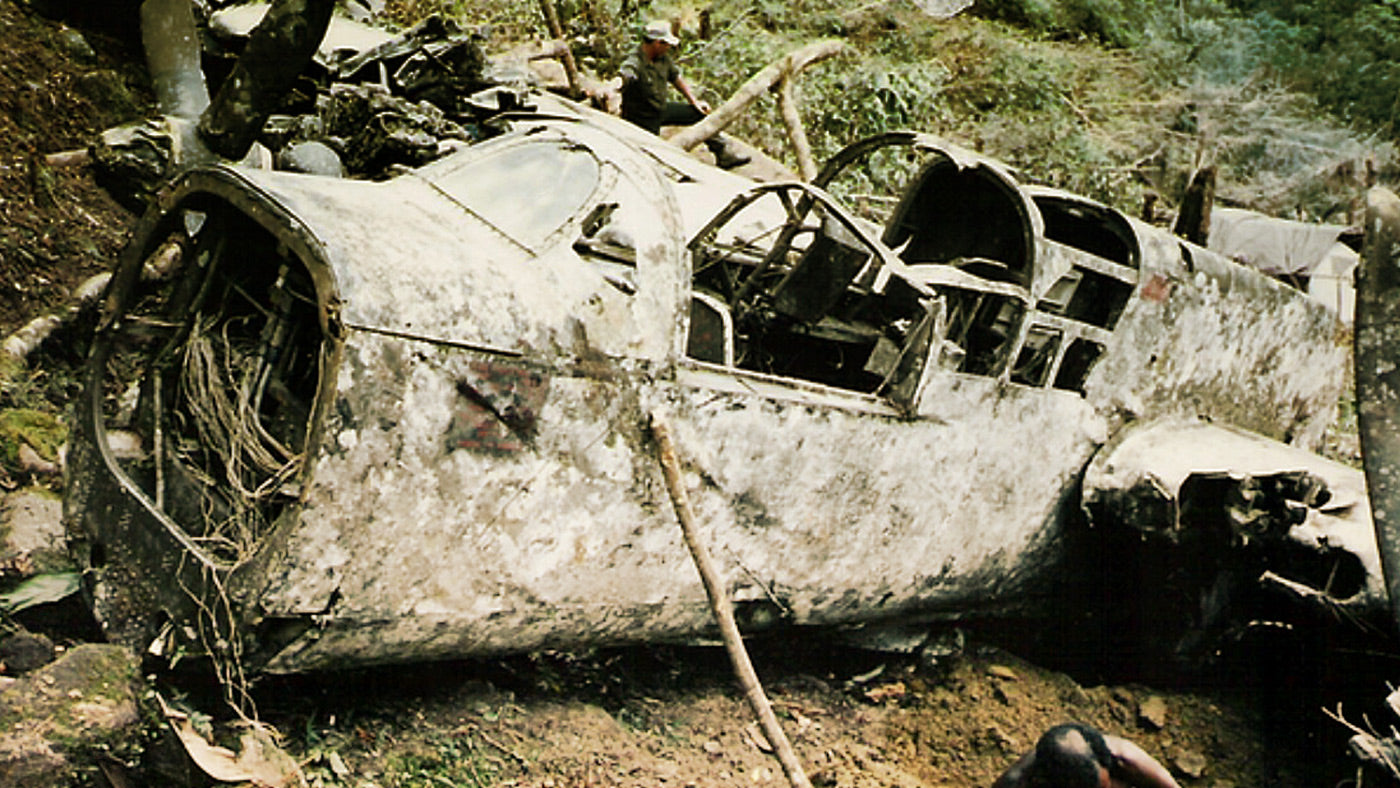
- by Dianna Lopez
P61: A Black Widow Becomes A Midnight Queen
- by Dianna Lopez
A question? Visit our contact page
This site uses cookies for better user experience and analytics.

The P-61 Black Widow was a successful night fighter aircraft, designed to fill a need during the London Blitz but built too late to fulfill that role. Read on to learn more about 42-39445, one of only four remaining Black Widows in the world and currently under restoration by the Mid Atlantic Air Museum.
The P-61 Black Widow is a twin-engine, twin-boom, all metal, heavy fighter aircraft built by Northrop Aviation for the United States Army Air Forces during World War II. The P-61 was the first aircraft specifically designed as a night fighter, to fill a major hole in both the U.S. and British air defenses. The P-61 was the first fighter designed with radar, which allowed it to be used for night intercept missions. The maiden test flight took place on May 26, 1942, and the first production aircraft came off the assembly line in October 1943. 706 total were built.

The P-61 was relatively large for a fighter aircraft, with a wingspan of over 66 feet and a length of over 45.5 feet. It was powered by two Pratt & Whitney R-2800 Double Wasp radial engines. It was armed with four 20 mm Hispano M2 forward firing cannons, four M2 Browning machine guns in a dorsal gun turret, and the ability to carry a variety of bombs and rockets for attacking enemy aircraft/ground targets. The P-61 had a crew of three: a pilot, gunner, and radar operator, and was equipped with a variety of radar systems for detecting and tracking enemy aircraft.

P-61 cutaway, author unknown
The P-61 was operated by the U.S. Army Air Forces in the European, Pacific, China Burma India, and Mediterranean Theaters during World War II. After the War, it was redesignated as the F-61 and served as a long-range, all-weather, day/night interceptor for the USAF Air Defense Command until 1948, then with the USAF Fifth Air Force until 1950, retiring from service in 1954.
It was Lady in the Dark, a P-61B from the 548th Night Fighter squadron, that is credited with the last two “kills” of World War II.
In the early years of World War II, the British Air Force were flying mainly outdated aircraft such as the Bristol Blenheim and Boulton Paul Defiant compared to their Axis counterparts. Detecting night attackers was difficult enough using searchlights, listening devices, infrared detectors, and ground based radar when available. A bogey, or a potential enemy aircraft, once detected, had to be identified by a night fighter able to maneuver close enough to see without a doubt. British night fighters also struggled with the absence of visible landmarks.

The YP-61 pre-production prototype. Public Domain, Link
With the Luftwaffe launching night time bombing sorties and heavy attacks on London and other British cities, there became an urgent need for a new night fighter. It needed to be fast enough to keep up with German bombers, have endurance for extended loitering, or to stay airborne for up to eight hours while they waited for bombers, and armed with a gun turret. It also needed to be large enough to carry a three person crew - pilot, gunner, and radar operator - and the radar unit. In 1940, advances in radar technology introduced smaller, lightweight radar units that could be placed in an aircraft and operated independently of ground stations. As it was still very secret, the radar operator was called a radio observer and the requirement called for the capability of carrying devices to “locate aircraft in the dark.”
Northrop Aviation, an American sub-contractor, won the design contract from the Army Air Corps in January 1941 for an interceptor/night fighter. Jack Northrop, an aerospace engineer, working from discussions with the British Purchasing Commission, began working on a design for a large twin-engine aircraft that satisfied both the Army Air Corps requirements as well as British needs. Northrop was given a Letter of Authority in December 1940 to produce two prototypes and two smaller scale models, designated XP-61. This was followed by a formal contract in January 1941, then a subsequent contract in March 1941 for thirteen service-test aircraft (YP-61) and a static test bed. The P-61 was on its way to becoming a reality.
The first XP-61 made its maiden flight in May 1942, nine months after the first production contract for 150 aircraft was placed. The prototype had been developed quickly but it would still be two more years before the P-61 was ready to enter service. Development was plagued by delays and increased costs due to issues with the turret design, engine problems, and difficulties integrating the radar system.

P-61 Radar. Public Domain, Link
Ultimately, the P-61, which entered service in 1944, arrived too late to fulfill its mission conceived during the Blitz against the Luftwaffe. However, it was a successful night fighter and was especially needed and welcomed in the Pacific theater.

Enjoy this training video from 1944 and learn everything a pilot needed to know about flying the P-61 Black Widow.
Thanks to historians and the restoration project we know a lot about this aircraft. 42-39445, construction number 964, was built as a P-61B-1-NO and delivered to the USAAF. It was disassembled and shipped to the Southwest Pacific Theater, where it was painted black and ready for night fighting. Some sources say it was nicknamed "Midnight Queen" - a fitting name for this aircraft.

42-39445 being restored by Mid Atlantic Air Museum. Photo by Daniel Berek, used with permission
On January 6, 1945 it was assigned to the 13th Air Force 550th Night Fighter Squadron. The 550th Night Fighter Squadron was the last P-61 Black Widow squadron trained during World War II. They were assigned to the Thirteenth Air Force, arriving at Hollandia in the Dutch East Indies part of New Guinea in December 1944. They performed long range, night intruder missions on Japanese targets as distant as the Philippines, as well as direct infantry support missions.
On January 10, 1945 at 10 am, 42-39445 crashed while on a local “proficiency flight.” The crew and two passengers survived the crash into Mount Cyclops and were rescued two days later by a U.S. Army rescue team. The plane itself remained abandoned where it crashed, mostly intact. It may have remained there forever, if not for the imagination and sheer will of Eugene and Russ Strine. In 1991 the wreckage of 42-39445 was recovered and transported back to the United States.

The Mid Atlantic Air Museum (MAAM) is an aviation museum and aircraft restoration center based at Reading Regional Airport in Reading, Pennsylvania. The museum, founded by Russ and Eugene Strine, collects and restores historic warbirds and classic airliners, along with rare civilian and military aircraft.

Eugene Strine served in the US Navy as an aircraft mechanic and pilot during World War II. After hearing about and seeing photos of a P-61 Black Widow, which had crashed in the Cyclops Mountains in Jayapura in West Papua but remained intact, Eugene approached his son Russ, an aviation business owner, about recovering it. The two dedicated the next several decades locating, recovering, and now restoring 42-39445. In addition to their P-61 restoration, aircraft collection, and activities the museum hosts an annual World War II Weekend Air Show.


This video is about the P-61 restoration project, in which MAAM is restoring 42-39445 to flying condition.

“I first met the Mid Atlantic Air Museum team in 2022 at Oshkosh,” recalls MotoArt owner Dave Hall from his Torrance, California office. “I was thrilled that they were considering having us preserve the unusable skins from the recovery of the P-61 for PlaneTags.”

Hall and the MotoArt team were elated to acquire the original skins from 42-39445 that were replaced during the restoration process. Not only has the Black Widow been one of Hall’s “must-have” aircraft, but many PlaneTags collectors have asked for it over the years. “We’re just so honored to make this noteworthy plane a part of the PlaneTags fleet.”






The first PlaneTags of 2023 arrive January 5th at planetags.com. The P-61 PlaneTags will be a limited series of 3,200. They will be available initially in the following color variants:




Don't miss out on adding these to your collection as soon as you can. They can also be engraved to be used for a custom luggage tag or keychain or given as a meaningful gift.

We have had the honor of creating other Northrop-built PlaneTags in the past. Our Northrop T-38 Talon PlaneTags sold out, but you can read about the plane here: T-38 Talon: Pilot Trainer and USAF Workhorse.
Our N-156F PlaneTags are made from 59-4988, a Northrop F-5 Freedom Fighter prototype. Read its story on our blog - F5 Freedom Fighter: It Started With The N-156F Prototypes
Sikorsky H-5 Dragonfly: The Navy’s First Fleet Helicopter
Yakovlev Yak-3UA “Full Noise”: From Fighter to Reno Air Racing Competitor
The Yakovlev Yak-3 is widely regarded as one of the most effective Soviet fighters of World War II. Compact, lightweight, and optimized for low-altitude combat, it earned a strong reputation among pilots on the Eastern Front for its maneuverability and climb performance.
The Yakovlev Yak-3UA known as Full Noise carries that legacy into the modern era. Built in 1993 using original Soviet tooling and engineering drawings, later powered by an American Allison V-1710 engine, and campaigned in the Unlimited class at the Reno Air Races, this aircraft represents a rare intersection of wartime design, post Cold War reconstruction, and modern competition.
USS Midway History: Preserving the Materials of a Legendary Carrier
Working with a ship as historically significant as USS Midway carries a responsibility that goes beyond creation. Commissioned in 1945 and serving for nearly fifty years, Midway was not only a cornerstone of U.S. naval aviation, but a place shaped by daily work, movement, and life at sea.
This project, developed in partnership with the USS Midway Museum, is rooted in preservation first. The materials being used are not simply artifacts. They are elements that played essential roles in how the ship moved, operated, and sustained the people aboard her. Each piece tells a different part of Midway’s story, and together they offer a fuller picture of service aboard one of the most important aircraft carriers of the 20th century.


Share:
P-3 Orion: Mission Ready For Over Sixty Years
CRJ 200: Delta's Reliable Regional Jet